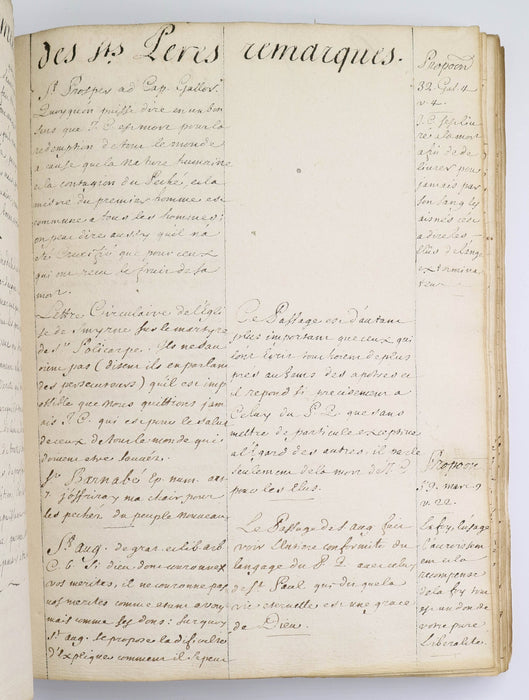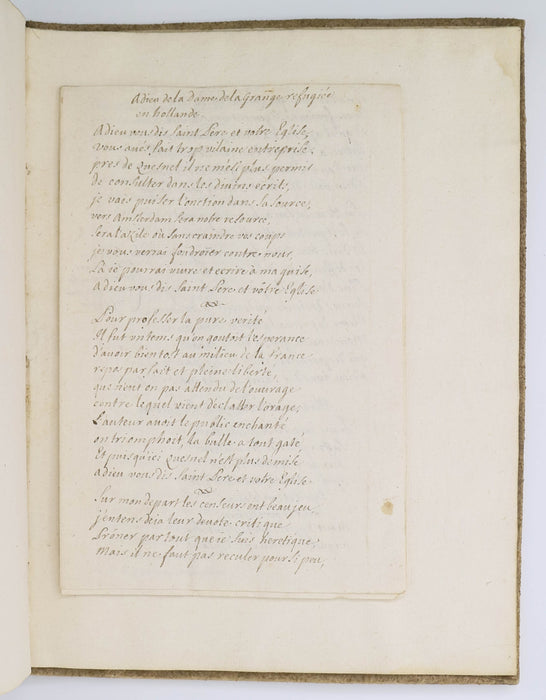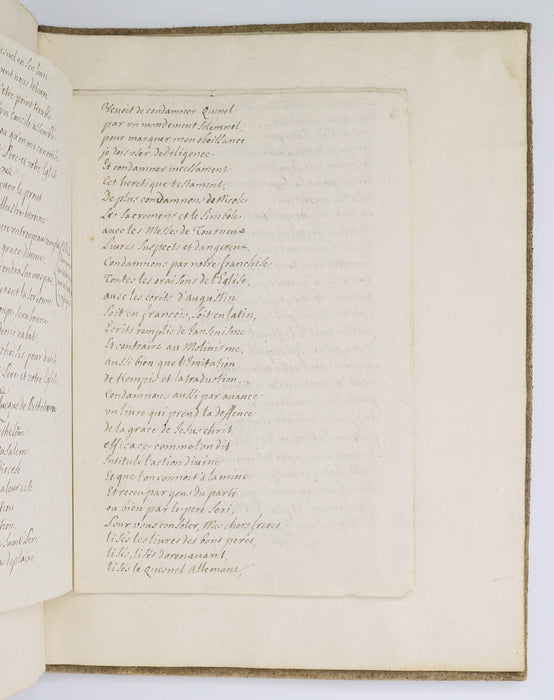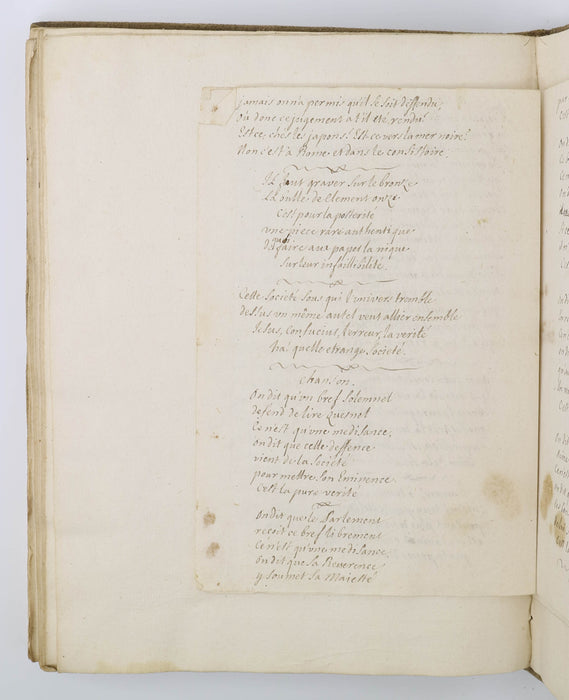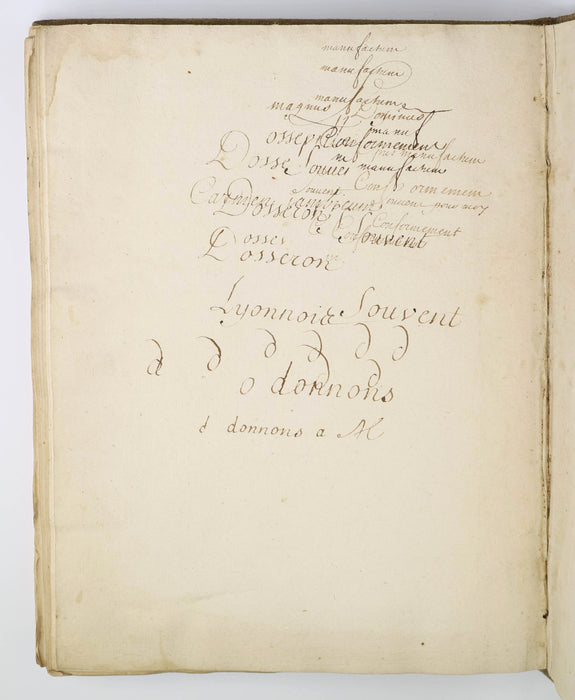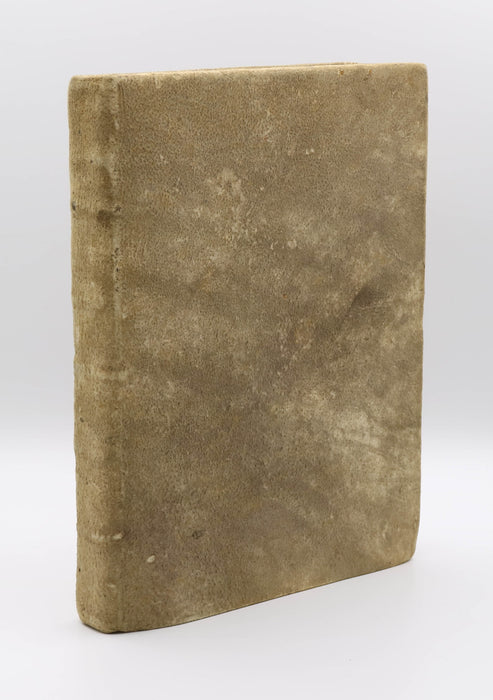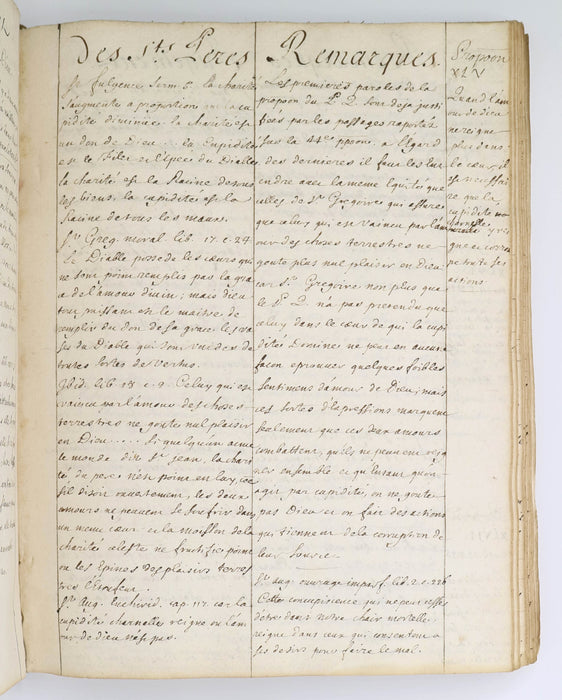
POETRY, PRISON, AND A PORT-ROYAL HEROINE
[Unigenitus]: Memoire presenté a l’Assembleé du Clergé sur la Constitution du 7.e September 1713. S’il est a propos de se contenter d’explications pour la recevoir [and other texts] [France, eighteenth century].
An attractively presented compilation of manuscript items principally relating to ‘Unigenitus’, with texts in a variety of genres and forms including commentaries, letters, epigrams, and poems. It might best be described as a Jansenist commonplace book, one containing contributions in multiple hands and even a pressed plant (fol. 70v). This manuscript shows that ‘Unigenitus’ was open to satirical response.
Some of the most striking poetry appears on loose bifolia at the end of the volume, written in a hand unique to this section and quite possibly stored here to be copied into blank spaces later. This includes a six-line poem mocking papal infallibility with respect to ‘Unigenitus’. It begins ‘Il faut graver sur le bronze / La bulle de Clement onze’ (‘One must engrave upon the bronze / the bull of Clement eleven’). According to a contemporary issue of ‘Mercure historique et politique’ – a news periodical printed in the Dutch Republic but intended for French readers – the poet was imprisoned for writing this satirical sestet.
Another satirical poem prompted by ‘Unigenitus’ appears in close proximity — though in this case it is the Jansenists themselves who were originally the intended object of mockery. Entitled ‘Adieu de la Dame de la Grange refugiee en holland’, the 40-line poem tells the story of a fictitious woman who flees to Amsterdam because of her pro-Quesnel views. The word ‘Grange’ in the title evokes Port-Royal; this was the name given to the home of the ‘Solitaires’ who lived an ascetic life on the abbey grounds.
The speaker of the poem hopes to ‘complete the project of the illustrious heroine Madame De Fontpertuis (‘Puisse je enfin achever le projet / De Fontpertuis, cette illustre heroine’). This is contextualised in a printed edition of the poem from 1714 in which a footnote appears to mock Madame Fontpertuis for her foolish desire to set up a ‘une eglise de pretendus Jansenistes dans une ile du nord’ (a church of so-called Jansenists on an island in the north). This footnote suggests that the poem is a parody, as does a further footnote attributing the work to the Jesuit Jean-Antoine Du Cerceau (1670-1730).
Conspicuously, there are no such accompanying footnotes here. It is tempting to infer that the copyist was trying to shift the tone, deliberately omitting the paratext that emphasizes the satirical anti-Jansenist context. Indeed, Madame de Fontpertuis can justifiably be seen as a Jansenist ‘héroïne’ in other ways: she ‘built a chateau near Port-Royal des Champs’, ‘served as the financial agent for … Quesnel’, and her Parisian home ‘became a refuge for Jansenists’ (Strayer 2008, p. 137).
In the body of the manuscript, Jansenist sympathies are in evidence. The longest text is an abridged and simplified version of ‘Les Hexaples ou les six colomnes sur la constitution Unigenitus’ (fols. [27r]-[70v]; preceded by an excised folio). This pro-Jansenist text, first printed in Amsterdam in 1714, adopts a visually impressive multi-column format so that Quesnel’s condemned propositions can be read alongside relevant material. In this version, the text is presented in three columns rather than the usual six. Respectively, these columns contain the propositions themselves, ‘Jugement des Sts Peres sur la Lecture de l’Ecriture Ste’ Jugement des Sts Peres sur la Lecture de l’Ecriture Ste’ (i.e., Judgement of the church fathers on holy scripture), and further ‘Remarques’ (‘Remarks’).
A working handlist is available on request.
Details
Manuscript. One volume, 22 x 16.5 cms in binding, ff. [135]; all except c.25 folios with writing. Collation: 18 (with 1 used as a pastedown; –2 –3 –8) 28 (–1) 38 48 (–8) 5–138 148 (–3) 15–168 178 (with 7 and 8 used as pastedowns), with six leaves excised (see discussion below).
Multiple scribal hands. Folios [5r]-[26v] written in long lines framed by two vertical rules, with typically c. 26 lines per page. Folios [27r]-[70r] written in three columns, organised using three vertical rules (number of lines varies considerably). Folios [70v]-[108r] mostly in long lines with no ruling, a variable number of lines. Folios [109r]-[114v] generally in verse, a variable number of lines, with only fols. [114r]-[114v] in two columns. Pen trials to folios [1r] and [135v].
Bound in reversed alum-tawed skin over boards. Multiple layers of pastedowns at front and rear. The uppermost pastedown at rear is only loosely attached; the lowermost pastedown at rear, which is mostly obscured, constitutes printed waste material.
Insertions
Two unstitched bifolio loosely inserted between folios [131v] and [132r], effectively a loose quire of four leaves. Folded size approx. 16.5 cms x 11 cms. No pagination or foliation. Variable number of lines per page. Final verso blank. Light to medium staining, one fold line.
A further bifolium follows immediately thereafter with the same dimensions, again no pagination or foliation. Variable number of lines per page. Final verso blank. Lightly stained, multiple fold lines.
Condition (textblock): light browning and staining, loosening to textblock. Condition (binding): rubbing to covering material.
Bibliography:
Hexaples ou les six colomnes sur la constitution Unigenitus (Amsterdam, chez Gerard Kuiper, 1714).
Koopmans, Joop W., Early Modern Media and the News in Europe: Perspectives from the Dutch Angle (Leiden: Brill, 2018), p. 17 (on Mercure historique et politique).
Mercure historique et politique … Mois de Janvier 1714… Tome Cinquant-Sixième (A la Haye, chez Henri van Bulderen, 1714), pp. 186-87 (for ‘Il faut graver’ poem)
Müller, Wolfgang, et al, The church in the age of absolutism and enlightenment (New York: Crossroad, 1981), p. 385 (discussing the Hexaples).
Recueil de poësies de Differens Auteurs, faites au sujet de la Constitution de N.S.P. le Pape, pourtant condamnation des Réflexions du Pere Quesnel sur le Nouveau Testament (N.pl., n.p., 1714), pp. 21-22 (for ‘Adieu’ poem).
Strayer, Brian E., Suffering Saints: Jansenists and Convulsionnaires in France, 1640-1799
(Eastbourne: Sussex Academic Press, 2008).

